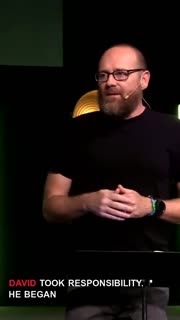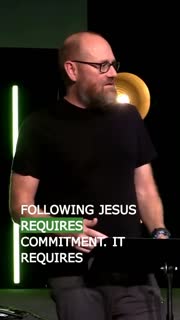Building a Lasting Legacy Through Faith and Humility
Devotional
Sermon Summary
Bible Study Guide
Sermon Clips
1. "His decision to prepare for the temple, even though he wouldn't build it himself, shows us the power, the power of planning for the future of building for the future of doing things that set other people up for a future that we are not going to see or experience." [27:41] (17 seconds)
2. "David took responsibility. He began preparing for the work, investing his own time and money and efforts into that work, ensuring that Solomon and the people would have what they need. He spent time discussing what the temple was going to look like." [28:59] (21 seconds)
3. "Here's what Solomon does with his power. Here's what Solomon does with his firm control over God's kingdom. He worships. He gathers the leaders of the people together. And he takes them to the place of worship." [31:50] (21 seconds)
4. "When we respond faithfully to God, that comes at a cost for us. There's a financial cost. Zane talked about it a few minutes ago. I talked about it last week. When we respond to God, it comes at a financial cost for us. It also comes at a cost of our time. It requires our time. It requires a time commitment. it requires effort on our part." [34:32] (29 seconds)
5. "Following Jesus requires commitment. It requires careful thought on our point. When we go into things like financial campaigns, it requires thought. It requires commitment. When we enter into a relationship with Christ, it requires commitment." [35:54] (19 seconds)
6. "God wants, everything that we have. God wants all of who we are. God wants us to use all of our finances in a way that glorifies him. It's not just 10% and then I don't have to glorify him with the 90% and I can spend this however I want to. It is 100% because there's a way to give to your local church or to your favorite Christian charity or your favorite organization. There is a way to do that and not give the rest of your life to that thing. But God gives it. God wants us to give all of it to him." [36:35] (39 seconds)
7. "When we worship God in a way where we are giving all of us, it automatically creates humility in our lives. Because when we focus on God's greatness, we see our own limitations. We see how we fall short. And this leads us to humility." [38:26] (18 seconds)
8. "Solomon had humility. He had to be willing to ask other people for things. Could you imagine what it would have been like? Probably, for the wealthiest person on earth at this time, to have to go to someone and ask them for their help. Hey, I need some, I need some trees. Can you, can you send them my way? I've got 25, well, I've got a trillion dollars, but I don't have a master craftsman. Can you send someone my way? See, this requires humility. It's not just about resources. It's about humility." [42:24] (37 seconds)
9. "We have to have a mindset for the future. We have to be prepared for the future that God is setting in front of us. And as Christians, we don't settle. We can't settle for having our wants and our wishes and our desires met today. We have to be looking ahead to a future that we may not see." [01:00:55] (27 seconds)
10. "God's kingdom is going to outlive everything. And we are invited into that. We are asked to participate in that. And what Solomon's dedication to worship and humility shows us is how transformed people live for the future. They make decisions based on what's going to happen, on what God is going to do." [01:04:39] (25 seconds)
Ask a question about this sermon
2. "David took responsibility. He began preparing for the work, investing his own time and money and efforts into that work, ensuring that Solomon and the people would have what they need. He spent time discussing what the temple was going to look like." [28:59] (21 seconds)
3. "Here's what Solomon does with his power. Here's what Solomon does with his firm control over God's kingdom. He worships. He gathers the leaders of the people together. And he takes them to the place of worship." [31:50] (21 seconds)
4. "When we respond faithfully to God, that comes at a cost for us. There's a financial cost. Zane talked about it a few minutes ago. I talked about it last week. When we respond to God, it comes at a financial cost for us. It also comes at a cost of our time. It requires our time. It requires a time commitment. it requires effort on our part." [34:32] (29 seconds)
5. "Following Jesus requires commitment. It requires careful thought on our point. When we go into things like financial campaigns, it requires thought. It requires commitment. When we enter into a relationship with Christ, it requires commitment." [35:54] (19 seconds)
6. "God wants, everything that we have. God wants all of who we are. God wants us to use all of our finances in a way that glorifies him. It's not just 10% and then I don't have to glorify him with the 90% and I can spend this however I want to. It is 100% because there's a way to give to your local church or to your favorite Christian charity or your favorite organization. There is a way to do that and not give the rest of your life to that thing. But God gives it. God wants us to give all of it to him." [36:35] (39 seconds)
7. "When we worship God in a way where we are giving all of us, it automatically creates humility in our lives. Because when we focus on God's greatness, we see our own limitations. We see how we fall short. And this leads us to humility." [38:26] (18 seconds)
8. "Solomon had humility. He had to be willing to ask other people for things. Could you imagine what it would have been like? Probably, for the wealthiest person on earth at this time, to have to go to someone and ask them for their help. Hey, I need some, I need some trees. Can you, can you send them my way? I've got 25, well, I've got a trillion dollars, but I don't have a master craftsman. Can you send someone my way? See, this requires humility. It's not just about resources. It's about humility." [42:24] (37 seconds)
9. "We have to have a mindset for the future. We have to be prepared for the future that God is setting in front of us. And as Christians, we don't settle. We can't settle for having our wants and our wishes and our desires met today. We have to be looking ahead to a future that we may not see." [01:00:55] (27 seconds)
10. "God's kingdom is going to outlive everything. And we are invited into that. We are asked to participate in that. And what Solomon's dedication to worship and humility shows us is how transformed people live for the future. They make decisions based on what's going to happen, on what God is going to do." [01:04:39] (25 seconds)










